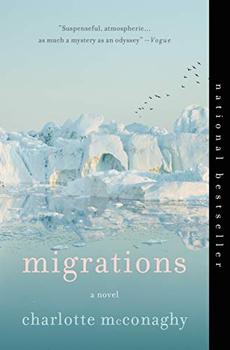Reading Guide Questions

Please be aware that this discussion guide will contain spoilers!
- The novel's epigraph is taken from a poem by Rumi: "Forget safety. / Live where you fear
to live." How does that directive resonate throughout Franny's life? Do you think it's good
advice?
- Discuss the novel's first lines: "The animals are dying. Soon we will be alone here." How
does the disappearance of wildlife in mass extinctions shape the characters and plot? What
are the similarities and differences between Franny's world and our own? Would you
describe this novel as dystopian? Why or why not?
- Arctic terns have the longest natural migration of any animal, and during their lives they may
travel the equivalent distance of to the moon and back three times. What do Arctic terns
symbolize in the novel, and why are Franny and Niall so drawn to them in particular?
- The first time Franny sees Niall lecture, he quotes Margaret Atwood: "We ate the birds. We
ate them. We wanted their songs to flow up through our throats and burst out of our
mouths, and so we ate them. We wanted their feathers to bud from our flesh. We wanted
their wings, we wanted to fly as they did, soar freely among the treetops and the clouds, and
so we ate them. We speared them, we clubbed them, we tangled their feet in glue, we netted
them, we spitted them, we threw them onto hot coals, and all for love, because we loved
them. We wanted to be one with them." Why does he pick that passage? How do the themes
of love and destruction echo throughout the novel?
- What does Ireland represent for Franny? Australia? Discuss the importance of home and
belonging in this novel, and how Franny's search for it shapes her life.
- Franny says: "It isn't fair to be the kind of creature who is able to love but unable to stay."
Why does she have so much trouble staying, even with the people she most loves? Did you
find that aspect of her character sympathetic? Right before their car accident, Niall tells
Franny, "There's a difference between wandering and leaving. In truth, you've never once
left me." Do you agree?
- Anik tells Franny: "The stronger you are, the more dangerous the world." What does he
mean? Discuss this statement with regard to Franny and Ennis in particular.
- Franny's conscience is split between protesting destructive fishing practices and depending
on a fishing vessel to follow the terns. She and Niall devote much of their lives together to
conservation, although their lifestyle sometimes runs counter to that effort (for instance,
they still drive, fly, smoke, etc.). Did you sympathize with these contradictions?
- At the Mass Extinction Reserve (MER) base, the conservationists prioritize saving animals
that help humanity, such as pollinators, rather than, in Franny's words, "the animals that
exist purely to exist, because millions of years of evolution have carved them into miraculous
being." Is that prioritization selfish or justifiably practical? What do we lose in allowing the
wild to disappear?
- Niall and the other scientists at MER argue over the best way to protect birds. Niall believes
that migration is inherent to their nature, while Harriet counters that they should learn to
survive without migration, as a necessary adaptation. Whose argument do you find more
convincing?
- In one of his lectures, Niall says of wildlife: "They are being violently and indiscriminately
slaughtered by our indifference. It has been decided by our leaders that economic growth is
more important." How does that resonate in our world, as leaders debate the appropriate
response to climate change? What is our responsibility to the planet?
- Franny loves the sea "with every breath of me, every beat of me." What does the sea
represent for her? Why is she so drawn to it?
- Franny describes her life up until she decides to follow the terns as "a migration without a
destination." Why do you think she spends so much of her life without ambition or
direction? What are the positives and negatives of that sort of existence?
- When Ennis tells Franny about his wife, Saoirse, asking him to leave so he won't see her
Huntington's disease progress, Franny is adamant: "You have to go back to your family. You
don't understand how important it is." Do you think Ennis was right to do what his wife
asked? Is his inability to stay similar to Franny's?
- Ennis tells Franny about Point Nemo, "the remotest place in the world, farther from land
than anywhere else." When she asks what it's like, he replies, "There's nowhere crueler or
lonelier... . It's quiet." Why are Ennis and Franny so drawn to Point Nemo? How does it
resonate with the rest of the novel?
- Franny believes "the fear world is worse than death. It is worse than anything." Do you
agree? What is she afraid of?
- Why does Franny take responsibility for the deaths of Niall and Greta? Do you think she is
right to blame herself and plead guilty?
- At a few key moments in the novel, including on the last page, Franny remembers her
mother's advice: "Look for the clues to life, they're hidden everywhere." What does she
mean? Discuss the role of fate vs. free will in these characters' lives.
- What does Franny hope to accomplish by following the terns on their last migration? What
about Ennis? What do you think the future holds for them?
Unless otherwise stated, this discussion guide is reprinted with the permission of Flatiron Books.
Any page references refer to a USA edition of the book, usually the trade paperback version, and may vary in other editions.






